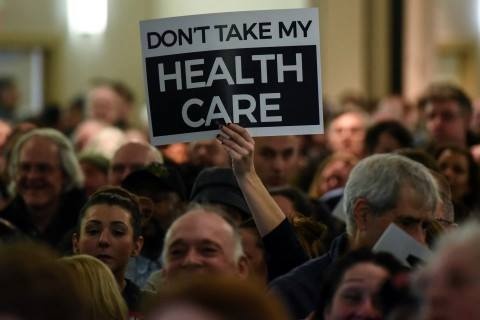Trumpcare fight to ramp up over Memorial Day recess

Trumpcare has inspired widespread protests, which will be ramping up again over the Memorial Day recess as activists work to block its passage in the Senate. (Photo from the People's Action Facebook page.)
When the House of Representatives passed the American Health Care Act (AHCA, also known as Trumpcare), earlier this month, health care advocates warned of the dire consequences it could have for the elderly, poor, and people with preexisting conditions. With the legislation awaiting action in the Senate, activist groups are ramping up efforts this Memorial Day recess to stop the bill from becoming law.
Among the organizations working to stop the passage of Trumpcare is People's Action, a national activist group with affiliates in 30 states. In partnership with Healthcare for America Now, a national grassroots campaign to protect the provisions of the existing Affordable Care Act, the group will host dozens of actions across the country over the holiday weekend. Die-ins, protests, and rallies will take place in states including Arkansas, Florida, Virginia and West Virginia.
"A decision that will affect the lives of millions of people now rests solely with the Senate," said LeeAnn Hall, co-director of People's Action. The group said it aims to make sure senators fully understand the opposition to the bill and how it would hurt families in their states. "They must kill the bill before it kills us."
Joining the organizing efforts to block Trumpcare over the holiday recess is MoveOn.org, which is encouraging its members to call their senators and urge them to oppose the bill. The Center for American Progress is also asking people to call their senators and have them pledge to "do no harm to the American health care system."
The Memorial Day recess actions come on the heels of the nonpartisan Congressional Budget Office's release this week of a report detailing the impacts AHCA would have. Among its findings:
- In all, 23 million people would lose health insurance coverage by 2026.
- More than half of the increase in the uninsured — 14 million — would come from reduced enrollment in Medicaid, the health care program for the poor, which is slated to be cut by $834 billion over 10 years.
- Insurance premiums for elderly low-income people would increase by as much as 800 percent.
There were serious concerns about the AHCA from the beginning, with critics warning that it would hurt people with preexisting conditions and lead to millions losing their insurance. House GOP leaders revised the bill in response but rushed to get it passed before the CBO could weigh in on the potential impact.
The AHCA would have a particularly devastating effect on Southern states, where many common diseases are most prevalent and where there are already high rates of people without health insurance.
It appears increasingly unlikely that the bill will pass the Senate as it stands. Sen. Lamar Alexander of Tennessee, chair of the Health, Education and Labor Committee, cited the CBO's AHCA score as a reason to put the House measure aside. He said the Senate is writing its own bill that will receive a CBO score before a vote.
Tags
Rebekah Barber
Rebekah is a research associate at the Institute for Southern Studies and writer for Facing South.
